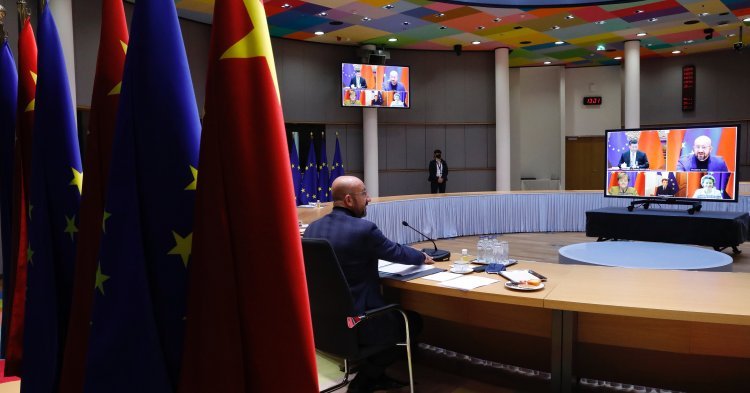Despite the range of polarising opinions that the agreement between China and the EU created, the agreement itself was not an act of surprise. Negotiations had been on the road for seven years. The years between 2013 and 2020 revealed, more than once, the complicated relationship between the EU and China.
The tainted relations between the EU and China have been informed by the former’s belief that China, as a global player, will adapt to democratic norms and by China’s unwillingness to follow suit. For a long time, the EU based its hope of a democratic China on the 1989 Tiananmen Square protests. In 1989, the Chinese military violently suppressed student-led demonstrations in Beijing’s Tiananmen Square, following the death of former Chinese Communist Party leader Hu Yaobang and mounting dissatisfaction with the country’s pace of reforms. As a response, the European Economic Community (EEC), the predecessor of the European Union, introduced sanctions and made demands for democratic freedoms that Beijing would never meet. China’s leader at the time, Deng Xiaoping, had a remarkable understanding of foreign states’ interests in the Chinese economy. His tactic was to stand firm and let foreign businesses pressure their respective governments to abandon sanctions and return to a more amicable stance towards China. Xiaoping’s tactic did not disappoint; the EU quickly became China’s most important trade partner.
The Tiananmen Square incident introduced a rift in EU policies towards China that exists till today. A sharp line is drawn between trade deals and human rights. China is a crucial economic partner and has been for 20 years. The new investment deal consolidates this relationship further, granting greater market access to EU investors and commitments for a fairer treatment of EU companies in China to enable equal competition between Chinese and European organizations. The CAI binds the EU even closer to China, creating greater interdependency, which works to the disadvantage of the EU’s stance against human rights abuses. The EU uses the language of ‘raising concern’ when discussing China’s treatment of political opponents, journalists, demonstrators in Hong Kong, and the Uighur community. However, even a quick search about the treatment of Uighurs brings the question of whether “raising concern” is an adequate measure to counter China’s abuses.
The Uighurs are a Muslim minority group with Turkic ethnicity who consider themselves ethnically close to Central Asian states. About 11 million Uighurs live in China’s Xinjiang region, which is currently declared autonomous. In reality, for the region and the people, autonomy is a foreign concept. They are closely bound to Chinese laws and regulations and, as President Xi Jinping proclaimed, need to align their religion and traditions to Chinese orientation and society. The process of alignment is a forceful one—hundreds of thousands of Uighurs are detained in camps in the West region of Xinjiang. The Chinese government calls the camps vocational facilities to counter terrorism. Activists dismantle this euphemism and call vocational facilities what they are: detention centres. For the detainees, the camps mean physical and psychological torture, strict surveillance and punishment, as well as the enforcement of confessions to renounce their belief. The hundreds of thousands of Uighurs in these camps did not receive a trial and do not know when they will be able to leave. Outside of the camps, the Chinese government focuses on the reduction of the Uighur population. A report published by the Jamestown Foundation, a global research institute, claims that Uighur women must abide by a child quota and undergo sterilization. They are also forced to abort pregnancies or take birth control without their free consent.
The brutality of this treatment demands more than just diplomatic language. In normative terms, it demands solidarity and a quest for justice from nations around the globe. In political terms, it demands sanctions and an unwillingness to bow to Chinese pressure on economic grounds. Meanwhile, China is betting on a truth that has worked since the days of President Deng Xiaoping—diplomats, politicians and people can protest, but at the end of the day, everyone wants to have a share of the Chinese economy.
The CAI has yet to be ratified by members of the European Parliament (EP). The EP cannot directly interfere with negotiations or set their objectives, but it can demand transparency and a focus on EU values. There are hopes that the EP will be vocal about these values in the ratification process and use its powers to make a clear stand for the EU’s approach to justice and human rights. Regardless of the state of ratification, the long negotiations on the CAI have brought to light the multiple layers of the EU-China relationship. This relationship could sail rather smoothly, based on both parties’ economic ambitions, if only these recurring human rights issues would somehow go away. But until then, they will leave behind an ugly stain.

Follow the comments: |
|
